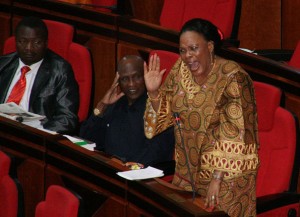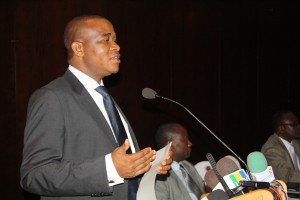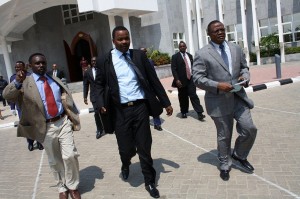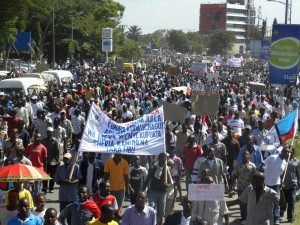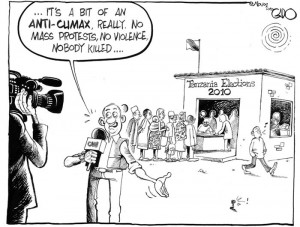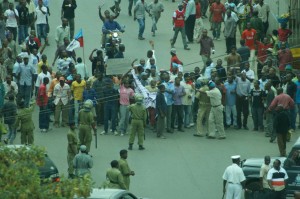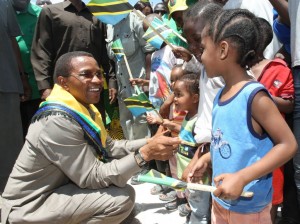
President Kikwete on the campaign trail in Dodoma (photo Issah Michuzi)
President Kikwete garnered 5.2 million votes or 61% of the 8,626,283 ballots cast, followed by CHADEMA’s Dr Willbroad Slaa, with 2.2 million votes or 26%. The new Vice President is the prominent Zanzibar leader Dr Gharib Billal, who was not voted for being part of President Kikwete’s ticket.
After seven by-elections were held in seats where there had not been enough ballot papers, the final result of the parliamentary elections for the 239 elected seats in the Union National Assembly (when special nominated seats for groups such as women and youth are added the total is 358 MP’s) was as follows: CCM 188. CHADEMA 24, CUF 21, NCCR-Mageuzi 4, United Democratic Party (UPDP) 1 and Tanzania Labour Party (TLP) 1.
By comparison the 2005 results were as follows: Kikwete 80% and out of 232 elected seats: CCM 206, CUF 22, CHADEMA 5, TLP 5, UDP 2 . Five seats were vacant at the time.
The number of MPs increases to more than 350 compared with 323 following the demarcation of new constituencies. The President also appointed additional MP’s representing special interests such as women and youth. After these appointments the number of opposition MP’s in the National Assembly was as follows: CHADEMA 45, CUF 34, NCCR 4, TLP 1 and UPDP 1 – Guardian.
In Zanzibar President Shein appointed a number of Special Seat MP’s making the composition of the House of Representatives CCM 28 and CUF 22.
REGIONAL DIFFERENCES AND PERSONALITIES
There were differences in regional voting patterns. CCM remained very strong in all the coastal regions and strong in most other areas. CHADEMA gained votes and seats in urban centres and, in particular in the Kilimanjaro, Arusha, Mbeya and Kigoma regions. Opposition parties in Klimanjaro Region won four seats – three CHADEMA and one TLP.
In Lindi the CCM candidate made some derogatory remarks about the CUF candidate. He advised voters that his opponent ‘suffered from albinism’ and should be avoided by voters who should … keep their distance from him because albinism was a curse. But the Albino is the new MP for Lindi.
The result in the constituency of former Prime Minister Edward Lowassa, who had been alleged to be involved in corruption, caused surprise in some circles. His electorate showed that they had not lost confidence in him by giving him an overwhelming majority.
Former prominent minister and MP Augustine Mrema is back in the forefront of Tanzanian politics after his success in the elections in Moshi. He himself became MP for Vunjo and his TLP party did well in the civic elections.
Former Speaker of the National Assembly Samwel Sitta said that in his new position as Minister for East African Cooperation, he would continue advocating ethical and transparent leadership as he had done when he was Speaker. During his heyday he had given government leaders a tough time by allowing fiery debates that led to the resignation of the then Prime Minister Edward Lowassa – Mwananchi.
The new Speaker is Anne Makinda, Njombe South MP (CCM), the first woman in the country’s history to be elected to this post. She brings a wealth of experience having been an MP for 35 years, and having been the deputy Speaker for five years.
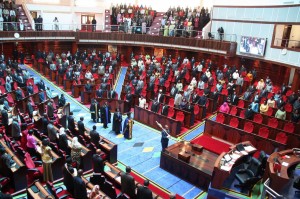
Speaker Anne Makinda at the opening of parliament - photo Aron Msigwa and Anna Itenda
CHADEMA won its first seat in Manyara region when its candidate Mustapha Akunaay, the outspoken executive secretary of the Tanzania Association of Tour Operators, defeated veteran CCM Minister Phillip Marmo by a margin of over 20,000 votes.
In the Arusha council elections a CHADEMA Rastafarian was elected: The Citizen wrote: ‘Donning his characteristic curled hair and a green-and- yellow cap associated with the culture, astounded some of his political rivals. During the campaign he was perceived by his rivals as a marijuana smoker unfit for leadership because of his behaviour which ‘resembled that of some famous Rastafarians in the Caribbean.’ However he insisted that he had ‘never ever’ smoked bhang or any other narcotic drug and did not plan to do so. CHADEMA had advised him to remove his Rastafarian attire “But I told them that I had better leave politics than remove my Rasta fashion. Since then nobody has ever discussed this matter with me again “ he said.
Another of the new MPs is rapper and Bongo Flava artist Sugu (Joseph Mbilinyi) who won the Mbeya Mjini seat for CHADEMA. He defeated the incumbent CCM candidate Benson Mpesya by 46,411 votes as against 24,236. Sugu’s campaign had the theme “Tumaini Jipya kwa Maendeleo ya Wote” “New Hope for Development for All”. In an interview Sugu said “It pains seeing many musicians in the country failing to pay for a bus fare, while someone somewhere is eating the sweat of musicians.” Fellow musician Afande Sele says that he hopes Sugu will be able to reduce the problems Tanzanian musicians face due to widespread piracy of their work.
OPPOSITION CAMPAIGN
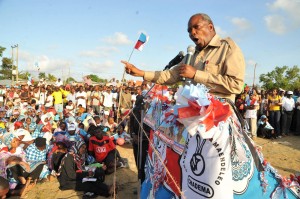
Dr Slaa addresses a crowd in Zanzibar - photo Emmanuel Herman
The CHADEMA presidential candidate Dr Wilbroad Slaa attracted massive crowds during the election campaign wherever he appeared. As an example, on September 19, the Guardian reported that business in Arusha came to a standstill for four hours as thousands of its residents rushed to welcome him. His decision to vie for the presidency ‘had changed the political wind in the country.’ A convoy of hundreds of vehicles accompanied the candidate to the rally grounds. Security officers were almost overwhelmed….Finally came the moment when Dr Slaa stood to address the crowd. “We have not ferried you from your homes to this place with lorries or buses…Neither did we give you free T-shirts nor khangas plus money to solicit you to come here….Your massive attendance is a demonstration that you are fully committed to change” he said.
Slaa said it was a shame that people from a nation endowed with abundant natural resources such as minerals and wildlife led a miserable life while countries with minimal or no resources such as Kenya were now offering education for free. He said Tanzanians, for a long time, had been victims of poor government policies, corruption and embezzlement of public funds. He added that CHADEMA would raise money to finance education and heath care services by cutting down public spending through reducing the size of the cabinet to not more than 20 seats, slashing MPs’ emoluments, abolishing some government posts, such as the post of district commissioner, and reducing procurement of government vehicles. He said other money would be generated after overhauling mining contracts. Slaa maintained that a CHADEMA government would waive all taxes on construction materials to enable people to construct decent houses.
CHADEMA’s founder, former Finance Minister Edwin Mtei, who also attended the rally, questioned the new culture in which those accused of corruption were being protected by the ruling party. This, according to Mtei, was the beginning of the downfall of Africa’s oldest ruling party – the CCM – Guardian
During the election campaign at a big rally in Lindi, CUF leader Professor Ibrahim Lipumba was quoted in Majira as saying that his party would like to see the country being run as it used to be under colonial authority which had been better than the present CCM government. He said despite the problems of colonialism, the suffering people now underwent was worse. In those days the current spiralling cost of living was unknown, while the poor people were now burdened with education fees he said. Lipumba claimed. “If it were not for the free education I got I would be in my village corralling cattle.”
Needless to say, with its vast financial resources the CCM also put on a well organised campaign and President Kikwete’s numerous rallies attracted huge audiences many draped in the party colours.
THE PRESIDENT’S INAUGURAL ADDRESS
Undeterred by the unprecedented walk out by CHADEMA MPs, the President continued with his inaugural speech to Parliament and emphasised the need to build a middle-class economy and empower small-scale and medium entrepreneurs, farmers, pastoralists and fishermen.
He outlined 13 priority areas, which his administration would concentrate on in the next five years.
He called for speedy healing of rifts created in the run-up to and during the elections to forge national unity.
He said the government would continue to equip the Tanzania People’s Defence Forces (TPDF) and the Police Force to safeguard the country’s borders, and protect the people and their properties.
He said he had noted religious incitement during the campaigns, which had fuelled rifts that could jeopardise national unity. “The elections are over. We must now concentrate on building our country,” he said, stressing his willingness to work with fellow politicians and religious leaders to end the rifts.
The government would also attract investment in new industries and revive the defunct ones. Efforts would also be made to ensure reliable power supply and infrastructure for factories. “We will establish and strengthen the Tanzania Investment Bank to lend to entrepreneurs. We will also strengthen SIDO to serve more Tanzanians,” he said.
In the past five years, he said, the country had reviewed contracts with major mining firms, some of which had started to pay taxes. A new mining policy as well as legislation had been enacted to boost local participation in the sector. More than $4.7 billion was earned from minerals. The government would now acquire shares in major mining firms. He said there were plans to establish and attract agro-processing industries as well as local processing of minerals such as gold and tanzanite.
On railways, President Kikwete conceded that the government did not handle the area well in the past five years, but said that had been a good lesson to the government. “Our efforts to improve railways failed. But we are determined that in the next five years, we will take the correct steps because we have learnt our lessons,” Tazara and the Central Line would be rehabilitated to standard gauge level from Dar es Salaam to Mwanza and Kigoma and a new railway from Isaka to Kigali, Rwanda and Bujumbura, Burundi built.
The construction of Dodoma University would be completed to pave the way for work on the Mwalimu Nyerere University in Butiama and the Muhimbili University of Health and Allied Sciences. The Mbeya Institute of Technology would be upgraded to a full university.
The government, he added, would continue to reduce dependence on hydropower generation. He said emphasis would be put on power production from natural gas, coal, wind and solar power.
“We plan to add 640MW to the national grid. We will increase the number or Tanzanians who get power from the current 14 per cent of the population to 30 per cent,” he said – Citizen
THE SURPRISINGLY LOW TURNOUT
Many observers were surprised when it was revealed that, of the 20,137,303 registered voters, only 8,626,283 or 42% voted, making it the lowest turnout since the restoration of multi-party democracy in 1992. In 2005, when Mr Kikwete was first elected President, the turnout was 72% of the 9.1 million voters. In the 1995 and 2000 General Elections, 76% and 84% of the registered voters cast their ballots, respectively. In the 2010 election 2.64% of votes were spoilt.
Following a Royal African Society/BTS meeting on the elections on November 9 in London, Ron Fennell summarised the views expressed on this rather disturbing aspect of the results. He listed the factors:
• ‘Voter indifference about the outcome – it would not change the existing system in which a privileged group received the benefits of economic growth;
• A defective electoral registration process – many people disenfranchised, some because they had no ID cards;
• Fear that the ballot papers were not anonymous and that there could be victimisation of anti government voters;
• Fear of intimidation by the security forces;
• A significant number of CCM incumbents failed to be re-nominated for the election – 83 out of 232. John Malecela and other old timers and power brokers lost their seats;
• The absence of realistic manifestos – for example CHADEMA proposed a national non-contributory pension system. The perception is that the President campaigned more on promises than on policies;
• Regionalist tendencies which could undermine the unity of the nation seemed to be on the increase. Warning signals of future discord from personal allegations of cultural divides; for e.g CHADEMA Christian and Chagga; CUF Islamic;
• CCM candidates boycotted the TV debates. Opposition candidates had found it difficult to get air time in previous elections;
• Public funding was biased in favour of the ruling party which also had access to government transport, security, buildings, and helicopters. According to the East African, government financial support for the election campaigns of the different parties (based on the results of the previous election) was as follows: CCM $1.5 million, CHADEMA $500,000, CUF $100,000.
THE NEW UNION CABINET
President Kikwete’s previous government had 60 ministers who were reduced to 47 in February 2008 following the Richmond scandal, which led to resignation of the then prime minister Edward Lowassa and two cabinet ministers. The President’s new government comprises 50 ministers – 29 in the cabinet and 21 deputies. There are three new ministerial positions and 24 new faces. 15 full ministers from the previous cabinet have been retained and the number of women remains at seven. The previous cabinet had 26 full ministers and 21 deputies adding up to 47:
Finance – Mustafa Mkulo (no change).
Foreign Affairs & International Cooperation – Bernard Membe (no change)
Home Affairs – Shamsi Vuai Nahodha (former Chief Minister of Zanzibar)
Energy and Minerals – William Ngeleja (no change)
Constitutional Affairs & Justice – Ms Celina Kombani (formerly Minister for Regional Administration and Local Government)
Regional Administration & Local Govt – George Huruma Mkuchika
Infrastructure Development has been split into two ministries:
Works – Dr John Pombe Magufuli; and, Transportation – Omari Nundu
Natural Resources & Tourism – Ezekiel Maige
Health & Social Welfare – Dr Haji Hussein Mponda
Lands, Housing and Human Settlements – Prof Anna Tibaijuka
Livestock Development & Fisheries – Dr David Mathayo
Communications, Science & Technology – Prof Makame Mnyaa Mbarawa;
Education & Vocational Training – Dr Shukuru Kawambwa
Labour & Employment – Philipo Mulugo
Community Development, Gender & Children – Ms Sophia Simba
East African Co-operation – Samwel John Sitta
Agriculture, Food Security & Cooperatives – Prof Jumanne Maghembe
Water – Prof Mark Mwandosya (Irrigation has been moved to the Ministry of Agriculture).
Among other changes:
Youth Affairs has been moved from Labour to the Information & Sports ministry. This led to an increase of the three positions. The President said the additional positions were needed to have ministers of state overseeing Coordination as well as Planning.
Under the Prime Minister’s Office, a new position focusing on investment promotion and economic empowerment has been created. The President appointed two ministers of state under his office – Mathias Chikawe for Good Governance and Stephen Wassira for Relationships & Co-ordination. Ms Hawa Ghasia retained her previous position as Minister of State, Public Service Management.
There are ministers of state for Union Affairs and the Environment in the Vice President’s Office.

